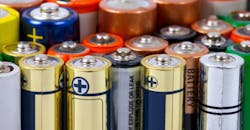It’s a component that gets no respect. We take it for granted, yet are totally dependent upon it. Universally reviled, it’s the part we cuss out whenever it fails. Yet we keep using it, and its usage is increasing.
Yes, you guessed it: the battery, quite possibly the oldest electrical or electronic component in the world. Some say it existed in the 250 B.C. to 224 A.D. time period, an incarnation today known as the Baghdad battery. But we know it better by its origin in Italy from scientist Alessandro Volta, who created the Volta pile around 1800. This was the first real battery. Even the lead acid battery we still widely use today was invented back in 1859. But while battery technology is older than virtually all other electrical/electronic technologies, it has not developed as fast or as extensively.
The good news about batteries is that they make things portable and mobile. They let us be independent of the AC mains for power. But the bad news is that batteries fail. Primary batteries like alkaline AA cells use up their chemicals, at which point we have to toss them and get new ones. Secondary batteries like NiCds and Lithium-Ions can be recharged and have a longer life. But they, too, eventually need recharging or die completely.
Regardless, we’re all happy to have batteries around. Some recent experiences made this clear to me.
Hurricanes, like the recent Harvey and Irma—which beat up Texas and Florida, respectively—made those of us involved to be thrilled to have batteries. Where I am in Texas we got 16 in. of rain and my fence blew down. And of course, the usual problem: loss of AC power. We were lucky not to lose power for any great length of time.
We have three uninterruptible power supplies (UPS) that kept our computers, cable modem, Wi-Fi router, VoIP phone, TV set, and a small lamp going for quite a while. The UPS batteries hold up for several hours with everything running, but by conserving power they lasted longer. Of course, we had several good flashlights. Thankfully, I did not have to turn on my noisy 5kw gasoline generator.
I have been seeing more solar generators available to take the place of gasoline generators. Most use a Lithium-Ion battery pack and a solar panel recharger. The power level is about 2 kw. Not bad, plus it’s noiseless (unlike the gasoline type) and uses natural energy. Tesla also offers its Powerwall, a home battery system with solar recharger. Expensive, but a super back-up. And what does Elon Musk’s new billion-dollar Tesla battery factory coming in 2020 have to say about the importance of batteries?
Recently I had a cordless phone handset go dead on me. (Yes, I still have a landline: a VoIP line via the TV cable connection.) The battery is a 4.5 V unit of a weird size and shape, but I did find one online (for $24!). So I shopped around some more and eventually bought a two-pack for $6.95. Amazing. Batteries truly are big and competitive business.
Of course, nothing makes you appreciate batteries more than our smartphones—another thing we can’t live without these days. Everyone is continually looking at their phone for a text, e-mail, social media alert, or search. The first thing we usually do when we visit someone is to ask where to plug in our phone charger. (Or is it to ask for the Wi-Fi password?) A dead smartphone makes most people panicked, angry, or depressed.
Luckily smartphone batteries, and those in tablets and laptops, generally have a reasonably long life. But we are still a slave to the AC mains for recharging unless you have one of those recharging battery packs or a USB charging port in your car. The growing use of wireless charging is changing how we recharge.
Hearing aids are another electronic device dependent upon batteries. My old original aids ate batteries like crazy—several per week. My new ones are 1.4 V zinc-air cells that are giving me about a full week. But they are still expensive and I am totally dependent on them.
I keep wondering what doesn’t have a battery in it these days.
And batteries are becoming more important than ever, especially with the exploding expansion of electronics in cars. Bigger ones are needed. Auto manufacturers upgraded from a 6 V to a 12 V battery in 1965. The 12 V systems are now overwhelmed with the continual increase in electronic content, so a 42/48 V system is in the works. Also, electric vehicles (EVs) and hybrids are growing in number. I suspect that one day we will all be driving an EV. This will happen faster if battery development improves and makes batteries smaller and more powerful.
What we would all like to see is a new battery with the power of an Interstate car battery but the size of a legacy 9 V battery, and to find it for $1. With one of these in your smartphone, maybe you could even jumpstart your car with a special adapter cable.
About the Author

Lou Frenzel
Technical Contributing Editor
Lou Frenzel is a Contributing Technology Editor for Electronic Design Magazine where he writes articles and the blog Communique and other online material on the wireless, networking, and communications sectors. Lou interviews executives and engineers, attends conferences, and researches multiple areas. Lou has been writing in some capacity for ED since 2000.
Lou has 25+ years experience in the electronics industry as an engineer and manager. He has held VP level positions with Heathkit, McGraw Hill, and has 9 years of college teaching experience. Lou holds a bachelor’s degree from the University of Houston and a master’s degree from the University of Maryland. He is author of 28 books on computer and electronic subjects and lives in Bulverde, TX with his wife Joan. His website is www.loufrenzel.com.

